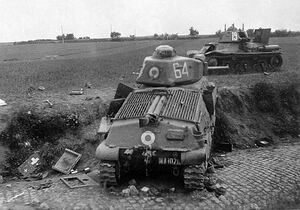Battle of Tân Xuyên
| Battle of Tân Xuyên | |||||||
|---|---|---|---|---|---|---|---|
| Part of the Quenminese Front of the Siduri War | |||||||
 Disabled Syaran tanks | |||||||
| |||||||
| Belligerents | |||||||
|
|
| ||||||
| Commanders and leaders | |||||||
|
|
| ||||||
| Units involved | |||||||
| Northern Imperial Front | Army Group Epsilon | ||||||
| Strength | |||||||
|
1,750,000 troops 4,800 tanks 3,900 artillery pieces 1,500 aircraft |
1,250,000 troops 3,000 tanks 6,550 artillery pieces 1,200 aircraft | ||||||
| Casualties and losses | |||||||
|
79,000 killed 4,000 captured 225,000 wounded 1,937 tanks destroyed 476 aircraft lost |
67,000 killed 20,000 captured 190,000 wounded 1,455 tanks destroyed 588 aircraft lost | ||||||
The Battle of Tân Xuyên was a battle fought between the Inner Sphere and the Common Axis in northern Quenmin in September 1936. Fought on the heels of Operation Rhipsaspia, the Common Axis hoped to blunt and destroy significant portions of Army Group Epsilon while lifting the threat to Quyen Tong Binh City in the Duong Pham Province. The battle began on 5 September with a massive armored offensive spearheaded by Cacertian and Quenminese armored divisions, backed up by Quenminese infantry and Cacertian motorized forces, led by General Phó Minh Duyên. Over the course of a week the Common Axis forces succeeded in effecitvely destroying three Inner Sphere armored and mechanized divisions, forcing Army Group Epsilon's 3rd and 4th Armies, and the Arkoennite Third Army, to withdraw further east. Over the objections of some commanders, including Duyên, the Cacertian and Quenminese senior command elected to continue the operation and attempt to drive the Inner Sphere from Quenmin entirely. The reconstituted Syaran and Arkoennite infantry divisions, dug in behind well entrenched defenses and heavily armed with anti-tank weapons, blunted the Common Axis offensive between 14-20 September while inflicting heavy losses on Common Axis armored forces.
Earlier in the summer the Inner Sphere had launched Operation Rhipsaspia, heavily damaging the Imperial Central Fronts and threatining the Quenminese capital of Cao Khoat. It was feared that Army Group Epsilon would outflank the Quenminese Northern Imperial Front and push south to threaten Phan Rang Ngai and Lairang, or push further east and threaten Cam Doc. By the summer of 1936 the Common Axis armies had become increasingly proficient in armored warfare, and despite heavy losses between June and August had managed to rebuild their forces in the north of Quenmin. The Syarans on the other hand had realized by 1936 that their Measured Battle Doctrine was illsuited towards the mobile armored warfare practicied by the Common Axis. This led Field Marshal Zdravko Merakovski to attempt to reform the Inner Sphere's armored formations, but Syaran tanks were difficult to adapt to this process, while Cacertian models like the Uragano and Ornitorinco were well suited to it. The primary advantage retained by the Inner Sphere was its plethora of artillery and plentiful supply of powerful anti-tank guns.
With nearly 8,000 tanks and armored vehicles involved, Tân Xuyên was the largest tank battle of the Siduri War. The battle demonstrated the superiority of Common Axis armored forces over their Inner Sphere counterparts, with the first week of battle resulting in the destruction of more than 1,000 Inner Sphere armored vehicles. However the battle also showcased the still developing nature of armored doctrine and effectivness of well-prepared and well-armed infantry against tanks. Tân Xuyên nevertheless represented the last major instance of Inner Sphere forces able to halt Common Axis armored offensives, as subsequent operations met with success as Common Axis mastery of armored warfare continued to grow and refine. The destruction of so many tanks further crippled Army Group Epsilon, and the force would not recover in time for Operation Kunai Grass, which drove the Inner Sphere from Quenmin entirely.